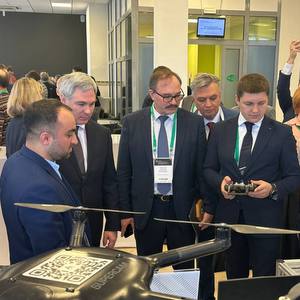Today, in the region, the cluster of unmanned aviation that assumes full-cycle drone production — from development, design and flight testing to serial production, training the personnel, servicing and maintenance — is being established. Samara University is a core for development of competencies in the area of unmanned aircraft systems (CDC UAS). Back in 2019, the first in Russia educational programs for UAV operators were organized here. Besides educational activities, the Centre for Unmanned Systems participates in interdisciplinary research projects, and is engaged in production activities. The University representatives will also develop prototypes of unmanned aircraft systems and their components, prepare all necessary documentation for organization of serial production.
According to experts, the University’s collaboration with specialized enterprises will make it possible to more efficiently achieve the results outlined in the Program for Unmanned Aviation Development in the Samara Region for 2024-2030, approved on October 12, 2023. The key goal of the Program is to create a new competitive branch of the economy in the region by 2030, including arranging favorable conditions for increasing demand for domestic unmanned aircraft systems and services with their use, efficient design and production of UASs and their components, development of the system of continuous training of industry specialists, and the scientific and technical potential, as well as safe use of UASs in the Samara Region. One of the tasks is creating in the region, in 2024, the research and production center for testing and competencies in the field of UAS development, ensuring the full cycle — from their design to certification and serial production.
The region has rich aviation heritage, industry, and infrastructure for flight testing, so it is geographically attractive to investors. For example, the company “Transport of the Future” is starting to construct the enterprise for the serial production of unmanned aircraft systems within the Special Economic Zone “Tolyatti”. The cluster of unmanned aircraft systems has started to develop in Samara due to its Governor Dmitry Azarov’s personal interest. In the spring of this year, he presented this initiative to the Russian President Vladimir Putin at a personal meeting, and received the state leader’s approval.
Samara University was one of the initiators of introducing in the region the experimental legal regime for drones. The Ministry of Economic Development of Russia has supported establishment of the experimental legal regime in the field of digital innovations for operation of unmanned aircraft systems in the Samara Region. The project provides for the use of drones for air transportation of goods, aviation work, including crops protection and forest fire conservancy.
Vladimir Bogatyrev, Rector of Samara University
Samara University is the leading in the Samara Region scientific and educational center in the field of unmanned aircraft systems. We implement educational programs for different target audiences — from schoolchildren and students to employees of industrial enterprises, public and municipal bodies. We teach piloting and operation of UAVs, their design, production and repair, develop special training complexes, manuals and programs for other educational institutions. Moreover, we are engaged in research and development activity aimed at import substitution. Today, our competencies in this area are in demand more than ever.
Dmitry Bogdanov, Acting Minister of Economic Development and Investments of the Samara Region
At the Samara Engineering Forum, we, together with representatives of federal ministries and experts, set several tasks, including one of assisting our developers with cooperation. At the exhibition to be held as part of the Forum, a number of exhibitors signed several agreements. Another important area in engineering is human resources. We will continue to work out mechanisms necessary for training specialists in the field. Samara University is one of leading universities, which has been already successfully working in this area, implementing its own educational program. It includes teaching disciplines, conducting practical training, and preparing teams for participating in regional and federal championships. My colleagues also involve industrial partners in this process, for future employment of graduates trained in the areas related to unmanned aviation.
